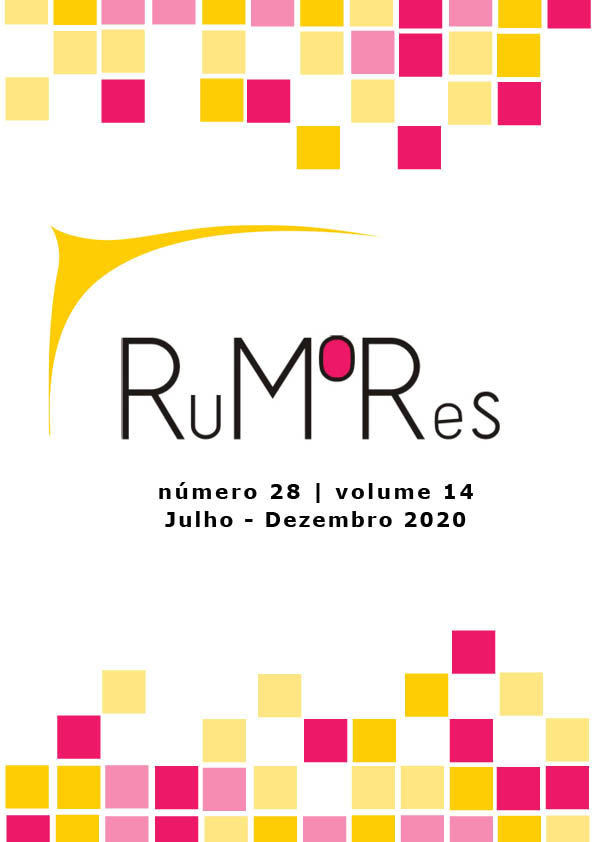Estar no lugar de alguém: um processo de negociação entre espectador e personagem a partir da “experiencialidade”
DOI:
https://doi.org/10.11606/issn.1982-677X.rum.2020.174430Palavras-chave:
Ficção seriada, Experiencialidade, Experiência estética, Personagem, Consumo midiáticoResumo
O artigo em questão discute o processo de produção de sentido em que se desloca a atenção para os personagens na ficção seriada. O argumento defendido é de que as séries tendem a elaborar um jogo para o receptor que, mesmo imerso em um enredo, é supervalorizado. Assim, o que se pretende apresentar como hipótese é que, na narrativa das séries, a centralidade do enredo é enfraquecida em função do processo de negociação pela audiência que, a partir da “experiencialidade”, coloca-se no jogo de repetir a trajetória de alguém. Tais argumentações pretendem responder a seguinte questão: o consumo das séries é uma tentativa de experiência estética relacionada mais a um convite de vivenciar no presente o lugar do personagem do que o de ser conduzido pela narrativa na qual já se prevê os acontecimentos? Parte-se de uma discussão teórica sobre o crescimento do consumo de ficção seriada, a estrutura desse texto narrativo e a relação entre esse tipo de consumo e a experiência estética, ou seja, um modo específico de temporalidade e de fruição, nas quais o receptor está implicado.
Downloads
Referências
Referências
ARISTÓTELES. Poética. São Paulo: Nova Cultural, 2000 (Coleção Os pensadores).
BALOGH, A. M. O discurso ficcional na TV: sedução e sonho em doses homeopáticas. São Paulo: Edusp, 2002
BENJAMIN, W. A obra de arte na época de sua reprodutibilidade técnica. In: Benjamin, W. Obras escolhidas: Magia e Técnica, arte e política. São Paulo: Brasiliense, 1986.
BENJAMIN, W. Magia e técnica, arte e política: ensaio sobre literatura e história da cultura. In: Benjamin, W. Obras escolhidas. Vol. I). São Paulo: Brasiliense, 2012.
CÂNDIDO, A. A personagem do romance. In: CÂNDIDO, A. et al. A personagem de ficção. 12ª. ed. São Paulo: Perspectiva, 2007.
CARR, N. The Shalow. What the Internet is Doing to Our Brains. New York: W. W. Norton & Company, 2010.
ESQUENAZI, J.-P. As séries televisivas. Lisboa: Texto & Grafia, 2011.
FEUER, J. Genre study and television. In: ALLEN, R. (ed.), Channels of discourse, reassembled: television and contemporary criticism. London: Routledge. 1992.
FISKE, J. Television culture. London: Routledge, 1987.
FOSTER, E. M. Aspectos do romance. 2ª. ed. Porto Alegre: Globo, 1974.
GARCÍA RIVERA, Gloria. Diccionario Digital de Nuevas Formas de Lectura y Escritura. Disponível em: http://dinle.usal.es/searchword.php?valor=Sensorium%20audiovisual%20y%20j%C3%B3venes.
HAMBURGER, K. A lógica da criação literária. São Paulo: Perspectiva, 1986.
JOST, F. Do que as séries americanas são sintoma? Porto Alegre: Sulina, 2012.
MARTÍN BARBERO, J.; REY, G. Os exercícios do ver: hegemonia audiovisual e ficção televisiva. São Paulo: Senac, 2001.
MARTÍN-BARBERO, J. Dos meios às mediações: comunicação, cultura e hegemonia. 2ª. ed. Rio de Janeiro: UFRJ, 1999.
MITTEL, J. Genre and television. Londres; Nova Iorque: Routledge, 2004.
MUNGIOLI, M. C. P. Gêneros televisuais e discurso: enunciação, ficcionalidade e interação na série Norma. Comunicação, mídia e consumo, vol. 9 n. 24, maio de 2012. Disponível em: http://revistacmc.espm.br/index.php/revistacmc/article/view/238.
OLIVEIRA, B. B. O personagem de ficção no mundo digital. Revista Viso, n. 17, jul.-dez. 2015.
OLIVEIRA, B. B. As narrativas seriadas e a experiência contemporânea. Revista O que nos faz pensar, n. 36, 2015.
OLIVEIRA, M. K. Vygotsky aprendizado e desenvolvimento: um processo sócio-histórico. São Paulo: Scipione, 1999.
SILVA, M. V. B. Cultura das séries: forma, contexto e consumo de ficção seriada na contemporaneidade. Galáxia, n. 56, 2014.
Filmografia
The passages of Walter Benjamin. A documentary film. 55min. 2014. WECHSLER, Judith (escritora, diretora e produtora); O’CONOR, Erika Volchan (editora). Publicado na plataforma on-line de vídeos YouTube em 24 fev. 2014. Disponível em: https://www.youtube.com/watch?v=rsbzzMRdIBg. Acesso em: 3 set. 2015.
Downloads
Publicado
Edição
Seção
Licença
Direitos autorais (c) 2020 Regiane Regina Ribeiro, Valquiria Michela John

Este trabalho está licenciado sob uma licença Creative Commons Attribution-NonCommercial-ShareAlike 4.0 International License.
Declaro a total e irrestrita cessão de direitos autorais sobre o texto enviado para publicação na Rumores – Revista Online de Comunicação, Linguagem e Mídias. Entendo que o conteúdo do artigo é de minha inteira responsabilidade, inclusive cabendo a mim a apresentação de permissão para uso de imagens, ilustrações, tabelas, gráficos de terceiros que, porventura, venham a integrá-lo.









